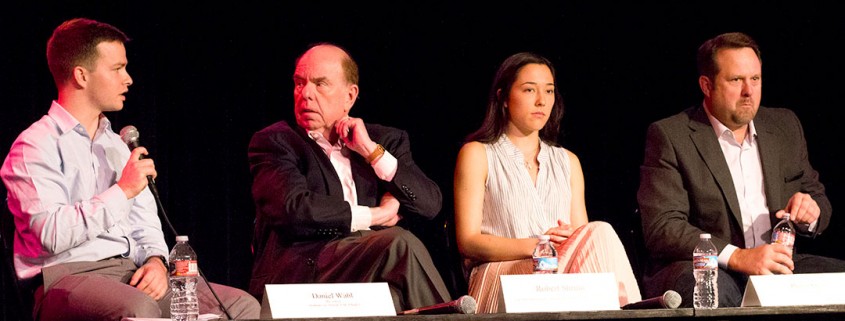Panel considers what to expect on election night
With less than a week to go before the presidential election, the Unruh Institute of Politics hosted the second-to-last event in its Road to the White House Series on Tuesday evening at Ground Zero Performance Cafe.
The panelists discussed what students can expect to take place over the next week as well as the latest installment of Democratic presidential candidate Hillary Clinton’s email controversy. In the wake of FBI Director James Comey’s announcement last Friday that the Bureau would reopen the investigation into Clinton’s private email server, there has been a shift in momentum among voters. What many saw as a clear-cut Clinton victory has suddenly became a tighter race.
The event, “Election Night Preview: What to Watch For,” included a panel featuring: Professor Robert Shrum, the Carmen H. and Louis Warschaw Chair in Practical Politics; Rob Stutzman, founder and president of Stutzman Public Affairs; Daniel Wahl, director of USC Students for Trump; and Philine Qian, a member of the USC College Democrats. Dan Schnur, director of the Unruh Institute, and Matt Lemas, editor-in-chief of the Daily Trojan, co-moderated the panel. The event was co-sponsored by the USC College Republicans, the USC College Democrats and the Daily Trojan.
Shrum began by clarifying that, though an announcement similar to Comey’s is quite rare so close to the election, it is not entirely as unprecedented in American politics as many may think.
“Something like this happened once before, which was when Lawrence Walsh, the special prosecutor in the Iran-Contra case, re-indicted on a third count Casper Weinberger four days before the 1992 presidential election,” Shrum said. “That was thought to be outrageous at the time.”
Rob Stutzman argued that, though Comey should resign due to his apparent willingness to engage in public discourse, the root cause of this affair can be traced back to U.S. Attorney General Loretta Lynch.
“This whole problem started … with [Comey] having to be in charge and take the lead on this investigation, because the Attorney General of the United States met for 30 minutes privately … with the former President of the United States William Jefferson Clinton,” Stutzman said. “Because of the appearances of impropriety at that meeting, Attorney General Loretta Lynch basically handed the baton to Comey, who hasn’t handled it very well.”
Despite this new development in the ongoing Clinton scandal, Stutzman and Shrum both agreed that it will not have a significant effect on the election as a whole.
Daniel Wahl, the only Trump supporter on the stage, offered his more optimistic opinion on the state of the Trump campaign.
“Donald Trump … received more votes in the primary than any other Republican nominee in history,” Wahl said. “He received 13 million votes, certainly more than Mitt Romney did in 2012 and [McCain did] in 2008 by a margin of roughly 5 million. He’s had so much enthusiasm among his base, and some, like Bill O’Reilly, say it’s the most they’ve seen in the history of politics.”
Students weighed in on the panel afterwards, pointing out the variety of viewpoints held by those on the panel.
“I always like that [the Unruh Institute] brings in a diverse panel,” said Alex Harutunian, a freshman studying business administration. “There was a Trump supporter today, which was the first time they’ve had one, but I always like that they have both Democrats and Republicans at their events. I have yet to see an independent or a third party supporter, but I think that’s because they’re pretty rare.”
Giulia Corno, a freshman majoring in political science and neuroscience, noted her frustration with the lack of focus on policy by the mainstream media.
“I honestly have not read any articles about what their policies are and what they actually think of certain issues,” Corna said. “I don’t know anything beyond the scandals, which is really frustrating for me, especially because this is the first election I’ll be voting in.”
Corna also identified with a comment made by Qian regarding the seemingly self-serving nature of the candidates, and how they appear to be willing to alter their policies to get donor money or support from broader demographics.
“[Philine] was talking about how she wants to see politics change, that it has to be about what’s right and what’s wrong instead of what will get [the candidates] the most money and the most voters,” Corna said. “You need to be putting policies out there that will improve the world, not improve your life.”
The Unruh Institute will host a poll-watching event in the Wallis Annenberg Hall next Tuesday starting at 3 p.m. Students can watch live as the results come in from each state and will have the opportunity to discuss the outcome of the election.

